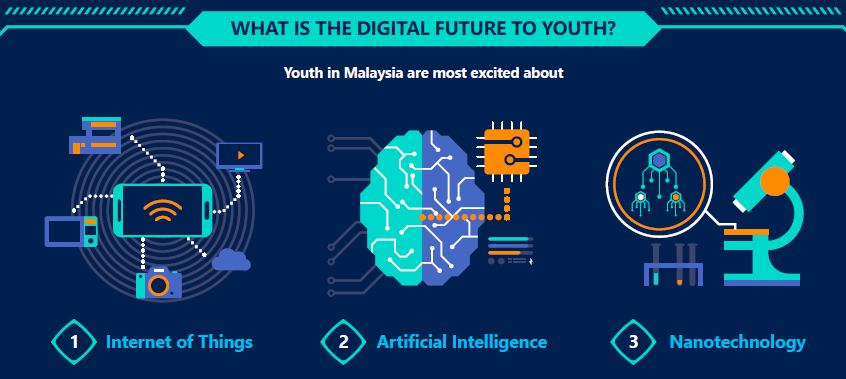Youth want technology innovations to increase their productivity, but concerns remain over impact on security and privacy as well as relationships becoming too impersonal
KUALA LUMPUR, 16 February 2017 — In our increasingly digital world, new and emerging innovations are set to disrupt the way people live, work and play. According to youth in Malaysia, the most exciting technologies expected to have the largest impact on their future lives will be Internet of Things (IoT), artificial intelligence (AI), and nanotechnology, based on survey findings released today by Microsoft.
Youth in Malaysia rank the Internet of Things as the most exciting technology innovation that will affect their lives. Click here to view the full infographic.
1,400 youths were polled across the Asia Pacific region, including 100 from Malaysia. Other markets involved in the survey comprise Australia, China, Hong Kong, India, Indonesia, Japan, Korea, New Zealand, Philippines, Singapore, Taiwan, Thailand, and Vietnam.
| Click here to find how oyster farmers are leveraging IoT to maximize their harvest. |
The Internet of Things (IoT) is ranked as the top technology that Malaysian youth expect to have the biggest impact on their lives. In recent years, the confluence of power devices, cloud and data has enabled bold visions on how IoT can be an integrated part of our digital future.
IoT refers to the ever-growing network of physical objects connected to the Internet and the communication that occurs between these objects and other devices and systems. This includes everything from street sensors, home appliances, wearables, and vehicles.
According to the survey, these are the three scenarios that youth anticipate that the biggest improvement to their lives from IoT (ranked from top):
- Smart homes where main appliances can “talk” to each other (47%)
- Traffic systems that can adjust in real-time to mitigate road conditions (23%)
- Smart buildings that can optimize energy usage according to changes in weather and number of occupants (20%)
| Click here to find how AI is breaking down language barriers in Skype Translator. |
The second-ranked technology that youth are excited about is artificial intelligence (AI).
AI involves the creation of intelligent machines or services that work and react like humans – a feature that is now increasingly found in almost everything from translation services to virtual assistants to video games. Leveraging the potential of AI to execute tasks such as data analytics, speech recognition, and problem solving, people can be empowered to achieve more and yet do less.
| Click here to find how Microsoft is enabling data storage in DNA molecules with nanotechnology. |
The third-ranked technology that youth are most excited about is nanotechnology.
Nanotechnology involves the manipulation of individual atoms and molecules with dimensions of less than one thousand-millionth of a meter. With nanotechnology, the properties of materials can be enhanced, making them stronger or lighter than usual. Nanotechnology can also be applied in many fields, such as medicine, electronics, and energy production.
The survey found that youth are looking forward to IoT and other technologies to help them to (ranked from top):
- Increase their productivity
- Facilitate the way they connect with people that they work with
- Improve their physical and mental health
K Raman, Managing Director of Microsoft Malaysia said, “With more than 60 percent of the world’s youth found in Asia Pacific, this region will be a hotbed for the world’s digital revolution. It is exciting to see how Malaysian youth are looking forward most to the benefits that future innovations can bring. Internet of Things, artificial intelligence, combined with nanotechnology, provide incredible digital transformation opportunities for nations and organizations to carve an exciting new future for all of us.”
Preparing for disruption
Looking ahead, only 20% of Malaysian youth feel their country is ready to adapt to digital disruptions. To address this, they feel a top priority is to ensure schools prepare students with the right skills to fully leverage future innovations (31%); creating conducive business environments to encourage start ups (31%); followed by making future technology innovations affordable and accessible (22%).
The survey also revealed some of the concerns held by youth around the increasingly digital world. Among their top three concerns are:
- Security and privacy (35%)
- Relationships becoming too impersonal (30%)
- Potential loss of jobs (18%)
“The top concern by youth around security and privacy reflects how people don’t use technology that they don’t trust,” said Raman. “As significant technological advances continue to permeate our daily lives, public-private partnerships will play a critical role in building a digital future based on trusted computing environments and unlocking all the potential that technology promises.”
According to the survey, youth feel strongly that public-private partnerships (40%) should take the lead in driving future technology innovations, ahead of the public sector or government (28%), and technology start ups (23%).
Public-private partnerships were deemed by youth to be the most effective way to drive innovations.

